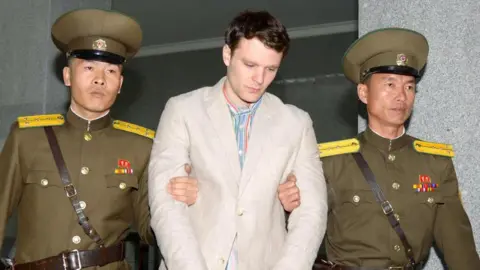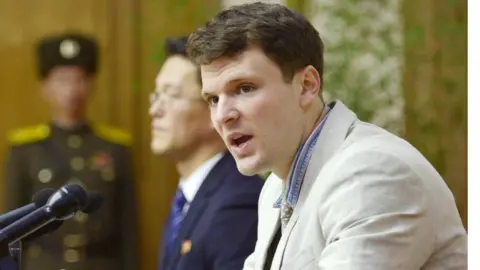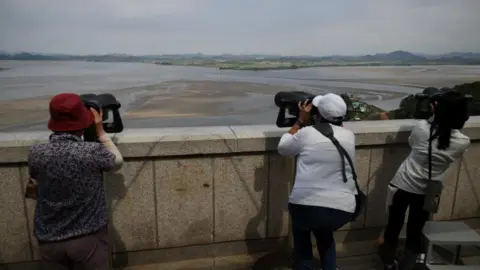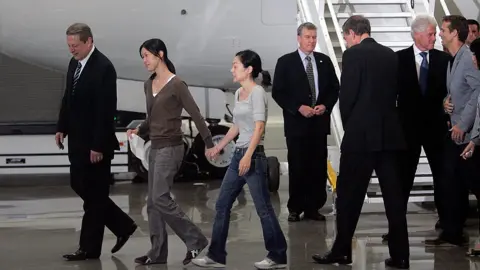What happened to US citizens like Otto Warmbier detained in North Korea
 Reuters
ReutersSince the guns of the Korean War fell silent on 27 July 1953, tens of thousands of US troops have remained in South Korea to cast a wary eye across the 38th parallel to North Korea.
Together with their South Korean allies, US forces regularly conduct large-scale military drills on the peninsula, frequently drawing angry rebukes from Pyongyang's government.
But despite these tensions and a lack of formal diplomatic relations between the US and North Korea, a small but steady stream of Americans have visited the country on organised tours - sometimes with dangerous results.
"Do not travel to North Korea due to the continuing serious risk of arrest and long-term detention of US nationals," reads a sternly worded travel warning on the US State Department's website. "The US government is unable to provide emergency services to US citizens in North Korea."
US citizens have been detained in North Korea several times since 1996, including tourists, scholars and journalists.
In July 2017, the US government banned US citizens from visiting the country - a move that has since been extended until at least August this year.
Here are some of the most notable cases from the last decade.
Otto Warmbier, 2016
Otto Warmbier, a student at the University of Virginia, was arrested while visiting North Korea as part of a tour group in January 2016. The visit, organised by a China-based budget tour operator that specialises in off-the-beaten-track destinations, was a five-day trip to experience North Korea during the New Year's Eve period. His father later told the Washington Post that he was "curious about their culture" and "wanted to meet the people of North Korea".
About two months after his detention on 2 January, a North Korean court sentenced Otto Warmbier to 15 years' imprisonment with hard labour on charges that he attempted to steal a propaganda poster.
Shortly after the sentencing, Mr Warmbier suffered a neurological injury under unclear circumstances.
He was freed - seriously ill - 17 months after his arrest, and died in a hospital six days after returning to the US in June 2017.
US doctors described Mr Warmbier as being in a state of "unresponsive wakefulness", but the Warmbier family said calling this a coma was "unfair".
His father said when they saw his son he was "moving around, and jerking violently, making these howling and inhuman sounds".
His head was shaved, he was blind and deaf, his arms and legs were "totally deformed" and he had a huge scar on his foot, he said. It "looked like someone had taken a pair of pliers and rearranged his bottom teeth".
"Otto was systematically tortured and intentionally injured by Kim and his regime. This was no accident," his father said.
 Reuters
ReutersA US federal court later found North Korea liable for Otto Warmbier's torture and death.
While North Korea did not formally contest the charges, it has repeatedly denied any wrongdoing.
The state-run Korean Central News Agency claimed he was provided medical care "with all sincerity" despite having "no reason to show mercy to such a criminal of the enemy state".
It also claimed that North Korea was "the biggest victim" of the death and subsequent "smear campaign" by the US.
Bruce Byron Lowrance, 2018
In October 2018, North Korea announced that Bruce Byron Lowrance - a 60-year-old from Michigan - had been detained while entering the country illegally from China.
US authorities later revealed that a man matching his name and description had been detained at the demilitarised zone separating North and South Korea. The man had allegedly told investigators that he believed that his visit would help ease geopolitical tensions between the two countries.
Mr Lowrance was released about a month after being detained, which US officials suggested may have been an effort to improve relations with the US following high-profile talks between Kim Jong Un and then US President Donald Trump.
He has not commented publicly on his detention and subsequent release.
 Reuters
ReutersMatthew Miller, 2014
Matthew Miller, a 24-year-old teacher from California, was taken into custody by North Korean authorities and charged with "hostile" espionage acts while on an organised tour in April 2014.
North Korean authorities later alleged he admitted to a "wild ambition" of exploring the country and investigating conditions there.
He was sentenced to six years' imprisonment with hard labour in September 2014. In interviews before and after his release, he said he spent much of his time digging in fields, moving stones and taking out weeds, but was otherwise largely kept in strict isolation.
Mr Miller was released the following month with another American detainee, Kenneth Bae.
In a later interview with journalist Nate Thayer of the North Korea-focused NK News site, Mr Miller said he went to North Korea with the intention of defecting and getting to "speak to an ordinary North Korean person about normal things", regardless of politics.
"I was trying to stay in the country," Mr Miller said. "They wanted me to leave. The very first night they said, 'We want you to leave on the next flight.' But I refused. I just did not leave."
In the interview, Mr Miller said he eventually "changed his mind" about seeking asylum and requested help from the US government.
Kenneth Bae, 2012
The man released with Mr Miller, Washington state resident Kenneth Bae, was arrested in November 2012.
A Korean-American Evangelical Christian missionary, he had visited the country many times. On this occasion he was stopped and a hard drive with Christian material was discovered.
North Korea levelled an array of charges for what it called Mr Bae's "hostile acts" including attempting to establish bases for anti-government activities, smuggling in forbidden literature, and encouraging dissidents.
He was sentenced to 15 years with hard labour, with state media suggesting that he only escaped the death penalty as a result of a "candid confession".
During his time in captivity, his family said that his health deteriorated as a result of poor conditions and difficult labour. Part of his captivity was spent in a labour camp for foreigners in which he was the only inmate.
Mr Bae was released and returned to the US along with Mr Miller following a secret visit to Pyongyang by Director of National Intelligence James Clapper.
After his release, Mr Bae wrote a memoir, "Not Forgotten: The True Story of My Imprisonment in North Korea" in which he said that he was interrogated from 08:00 in the morning until 22:00 or 23:00 at night every day for the first four weeks of his imprisonment.
His interrogators demanded hundreds of pages of confessions.
He said one interrogator kept telling him: "No-one remembers you. You have been forgotten by people, your government. You're not going home anytime soon. You'll be here for 15 years. You'll be 60 before you go home".
 Getty Images
Getty ImagesEura Lee and Laura Ling, 2009
In March 2009, North Korea arrested two California-based journalists, Eura Lee and Laura Ling, who were filming a documentary about humanitarian conditions on China's border with North Korea. Two other members of their crew, a US cameraman and a Chinese guide, escaped and were briefly detained by Chinese authorities.
Ms Ling later acknowledged they crossed the border, although she said they spent less than a minute in North Korea before attempting to turn back into China.
Ms Lee and Ms Ling were soon charged with crossing the border illegally and in June 2009 were sentenced to 12 years imprisonment and hard labour.
"I had tried to prepare myself for a lengthy sentence but nothing could prepare me for the verdict," Ms Ling later told National Public Radio. "I was wondering if those words meant that the window of opportunity had closed and my fate was sealed."
In August that year, however, both were released after a previously unannounced visit to Pyongyang by former President Bill Clinton.
While the visit came amid a flurry of back channel negotiations between North Korea's government and the Obama administration, the White House said that Mr Clinton's visit was a "solely private mission".
"No money was exchanged and no diplomacy was conducted," Ms Ling told NPR. "It truly was a private humanitarian mission".
